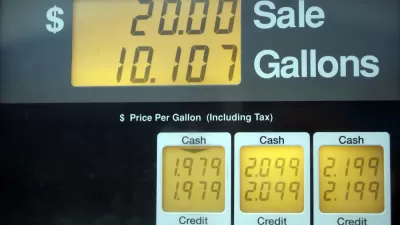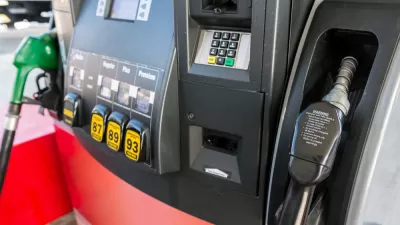The five-year transportation reauthorization known as the FAST Act relies on $70 billion of one-time, non-user fees to fund the $302 billion bill. The act also allows the government to fund the development of sustainable funding options by states.
Rep. Peter DeFazio (D-Ore.), ranking member of the House Committee on Transportation & Infrastructure, and Del. Eleanor Holmes Norton (D-D.C.), ranking member of the Subcommittee on Highways and Transit, "said in a letter to Transportation Secretary Anthony Foxx that states should begin experimenting with new infrastructure funding mechanisms now, despite the fact that Congress just passed a five-year, $305 billion highway bill last year," writes Keith Laing for The Hill.
"While the bill [PDF] was fully paid for, it did not resolve long-term solvency challenges of the Highway Trust Fund (HTF)," notes Norton's press release. "To help address this problem, the FAST Act establishes the Surface Transportation System Funding Alternatives program, which provides up to $95 million to enable States to test and demonstrate innovative methods to fund needed infrastructure improvements.”
An analysis [PDF] of the FAST Act [see page 14] by the Washington, D.C.-based American Road & Transportation Builders Association lists the program under Transportation Funding Alternatives:
The bill directs the Secretary to make grants to states to demonstrate alternative user-based revenue mechanisms that could maintain the long-term solvency of the HTF. The goal is to test at least two alternative user-based revenue mechanisms and to provide recommendations for adoption and implementation at the federal level.
Funding will be up to $15 million in FY 2016 and $20 million per year thereafter, and the federal share will be 50 percent
"DeFazio and Holmes Norton said Thursday that states should get to work now on finding a replacement for the beleaguered gas tax," writes Laing.
"We believe states are the laboratories of democracy, and the FAST Act provides the necessary funding to incentivize States to explore novel user fee structures that provide sustainable transportation funding."
Hat tip to Mayer Horn via University of Minnesota Congestion Pricing Listserv.
FULL STORY: House Dems want states to test gas tax alternatives

Planetizen Federal Action Tracker
A weekly monitor of how Trump’s orders and actions are impacting planners and planning in America.

Map: Where Senate Republicans Want to Sell Your Public Lands
For public land advocates, the Senate Republicans’ proposal to sell millions of acres of public land in the West is “the biggest fight of their careers.”

Restaurant Patios Were a Pandemic Win — Why Were They so Hard to Keep?
Social distancing requirements and changes in travel patterns prompted cities to pilot new uses for street and sidewalk space. Then it got complicated.

Platform Pilsner: Vancouver Transit Agency Releases... a Beer?
TransLink will receive a portion of every sale of the four-pack.

Toronto Weighs Cheaper Transit, Parking Hikes for Major Events
Special event rates would take effect during large festivals, sports games and concerts to ‘discourage driving, manage congestion and free up space for transit.”

Berlin to Consider Car-Free Zone Larger Than Manhattan
The area bound by the 22-mile Ringbahn would still allow 12 uses of a private automobile per year per person, and several other exemptions.
Urban Design for Planners 1: Software Tools
This six-course series explores essential urban design concepts using open source software and equips planners with the tools they need to participate fully in the urban design process.
Planning for Universal Design
Learn the tools for implementing Universal Design in planning regulations.
Heyer Gruel & Associates PA
JM Goldson LLC
Custer County Colorado
City of Camden Redevelopment Agency
City of Astoria
Transportation Research & Education Center (TREC) at Portland State University
Camden Redevelopment Agency
City of Claremont
Municipality of Princeton (NJ)




























